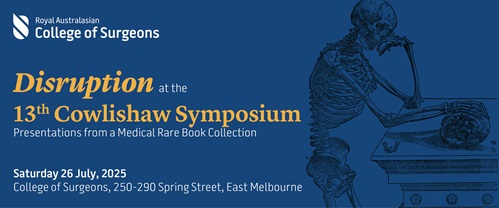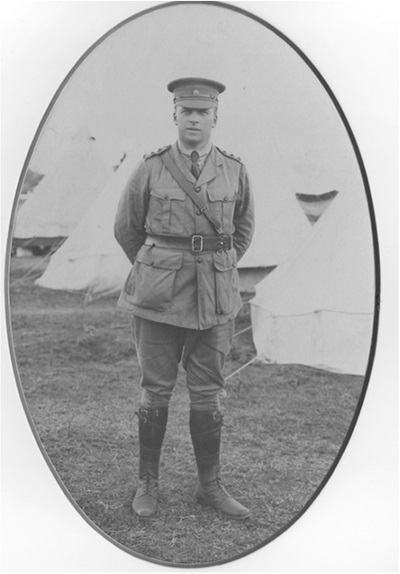2025 | Volume 26 | Issue 3

Author: Dr Tom Neerhut
After a six-year hiatus, the highly anticipated Cowlishaw Symposium returns on 26 July, marking its 13th iteration and its inaugural inclusion in Melbourne Rare Book Week. This event celebrates the importance of surgical history reflecting on the words of Leslie Cowlishaw: "The great vice of medical education is it’s tendency to fix attention on the latest and best only, and to neglect what has been accomplished in the past." The exploration of the rich history of medicine and surgery is particularly important in the lead up to the RACS centenary in 2027.

Leslie Cowlishaw in uniform (image supplied by Virginia West, granddaughter)
Leslie Cowlishaw – Where it all started
Cowlishaw graduated from the University of Sydney in 1906 (MB ChM) and later served as a medical officer in the 12th Light Horse Regiment during World War I. While recovering from illness in England, he visited and was mentored by Sir William Osler—renowned Canadian physician and bibliophile—whose influence spurred Cowlishaw’s life-long dedication to collecting rare medical texts. Today, six pieces of correspondence between Cowlishaw and Osler are preserved in the RACS archive—a testament to the historical depth of this connection.
On returning to Australia, Cowlishaw, a physician and bibliophile, championed the role of medical history in education. He advocated every Australian medical school should house a dedicated department for historical study. His private collection grew to more than 2000 volumes, including incunabula, classical texts, and works from pioneers such as Vesalius, Galen, Hippocrates, and Paré.
2019 RACS Cowlishaw collection
The enduring legacy of the Cowlishaw collection
Following Cowlishaw's death in 1943, his rare book collection was initially offered to the Royal Australasian College of Physicians (RACP). However, due to financial constraints, the RACP was unable to accept. Fortunately, Dr. Kenneth Russell convinced the then-president Sir Alan Newton to acquire the collection for the College. Dr Russell later became its honorary reader, producing a comprehensive catalogue of books published up to 1850.
Thanks to the tireless efforts of Dr Kenneth Russell, Dr Robert Gordon Craig, Leslie Cowlishaw, and subsequent curators, the museum and archived collections at RACS are an invaluable resource. The Leslie Cowlishaw collection boasts more than 2500 items, illustrating the evolution of medicine from ancient beliefs to modern science.
The collection is divided into two main periods—15th to 19th century, and mid-19th to 20th century—and features highlights such as:
• Avicenna’s Canon de medicina (1479)
• Two editions of Vesalius’ De humani corporis fabrica (1555 and 1568)
• Remmelin’s Survey of the Microcosme (1675), dedicated to Samuel Pepys
• Seminal surgical texts by Paré, Scultetus, and Gui de Chauliac.
This historical collection is a testament to our surgical predecessors and offers an unparalleled opportunity for academics, bibliophiles, and anyone interested in medical antiquity to connect with the past.
The Symposium returns: exploring ‘Disruption’
The Cowlishaw Symposium, first held in 1996 and running biennially until the 2020 pandemic interruption, returns this year with the theme of ‘Disruption’. It explores the numerous disruptions throughout medical and surgical history and their relevance in our contemporary world.
The symposium brings together a program of invited speakers who must reference at least one book in the Cowlishaw collection. The day will also include the esteemed Kenneth Russell Memorial Lecture.
The Cowlishaw Symposium will take place on Saturday, July 26 at the College of Surgeons Victorian Office, 250-290 Spring St, East Melbourne. The event is free but prior registration is necessary. Tickets are available here.
Note: The author would like to thank the RACS archivist, for their help and contributions to this article.
